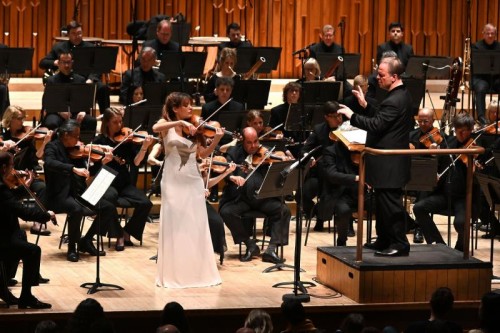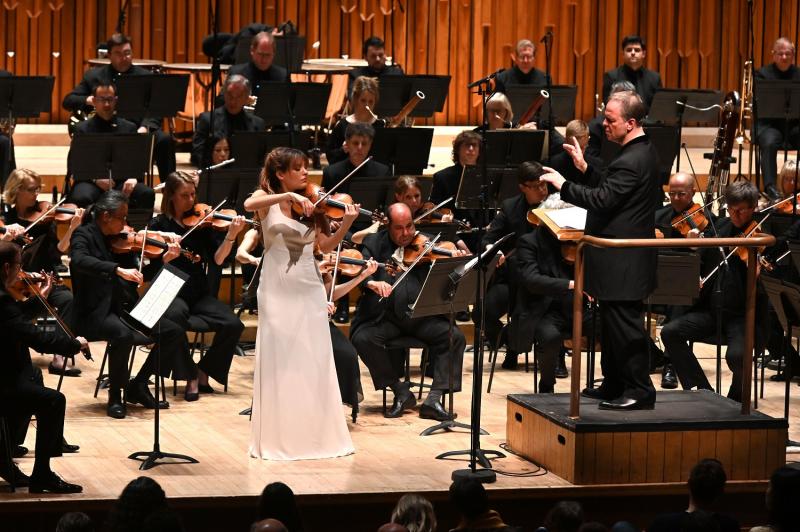 United Kingdom Elgar and Dvořák: Nicola Benedetti (violin), BBC Symphony Orchestra / Sakari Oramo (conductor), Barbican Hall, London, 25.4.2019. (AS)
United Kingdom Elgar and Dvořák: Nicola Benedetti (violin), BBC Symphony Orchestra / Sakari Oramo (conductor), Barbican Hall, London, 25.4.2019. (AS)

Elgar – Violin Concerto in B minor, Op.61
Dvořák – Symphony No.7 in D minor, Op.70
The Elgar must be the most taxing of all the big romantic violin concertos. It is not just that at 50 or so minutes it is the longest, but the poor soloist, having negotiated two difficult movements, is not just faced with an off-the-leash rondo finale romp, as in the Beethoven or Brahms, but a last movement that is long, complicated and just as taxing, if not more so, than the first. As Nicola Benedetti approached this last hurdle in her performance the impression arose that this had been in her mind from the beginning of the work. Not only did she tackle the cadenza in a gritty, determined fashion, as if this was the hardest nut to crack interpretatively and technically, but once she had very successfully surmounted it her performance assumed a new sense of freedom and flow that had not been apparent before. Sadly, it was too late in the day, and one could only imagine what could have been in her playing of the first two movements.
Sakari Oramo is a fine Elgar conductor, as he has shown us on previous occasions, and his account of the concerto’s opening material was very ardent and had just the right quality of flexibility of phrase. The music fairly seethed with emotion. In a way Benedetti’s playing as she entered the fray mirrored that of the conductor, but there it didn’t have quite the same sense of freedom. A certain quality of tension prevented this and even invaded her tone and technique. There was really nothing much wrong with either, to be sure, but an edgy, nervy quality hovered over her playing.
If Oramo was entirely successful in evoking the slow movement’s warm-hearted but slightly restrained, reposeful emotions, Benedetti was not quite able to match the conductor’s insight, for her playing had a more generalised expressiveness, and at times she seemed to be merely playing obbligato to Oramo’s perceptive conducting.
Anticipation was high that Oramo’s Dvořák with the BBC Symphony Orchestra would be on the same exalted level as his Elgar, but alas this was not to be. He at once put a burden on himself by adopting a basic tempo for the first movement that was too slow. Allegro maestoso is its marking and in Oramo’s reading there was not enough ‘allegro’ and too much ‘maestoso’. There should be a sense of lifted feelings and a triple-time bounce in the rhythms. Oramo tried hard to summon higher spirits without success, though his slow pulse did pay dividends in the more reflective parts of the movement, which had a certain charm.
The second movement, marked Andante sostenuto, was not in any case going to provide sufficient contrast with the first, but the unpromising situation was exacerbated by another tempo misjudgment, for again the music was taken too slowly, just slightly so this time, but enough to leave a slightly flat feeling in its execution.
Oramo’s tempo for the third movement, which is cast in the style of a Bohemian Furiant dance, was pretty well spot on. But if only he had made the music dance more: the rhythm became routinely stodgy, and over-prominent timpani gave the music an unwarrantedly militaristic quality. There was some quite nice phrasing in parts of the finale, but overall there was a slightly muscle-bound nature in the music-making, sternly underpinned by more over-enthusiastic drumming.
Alan Sanders
